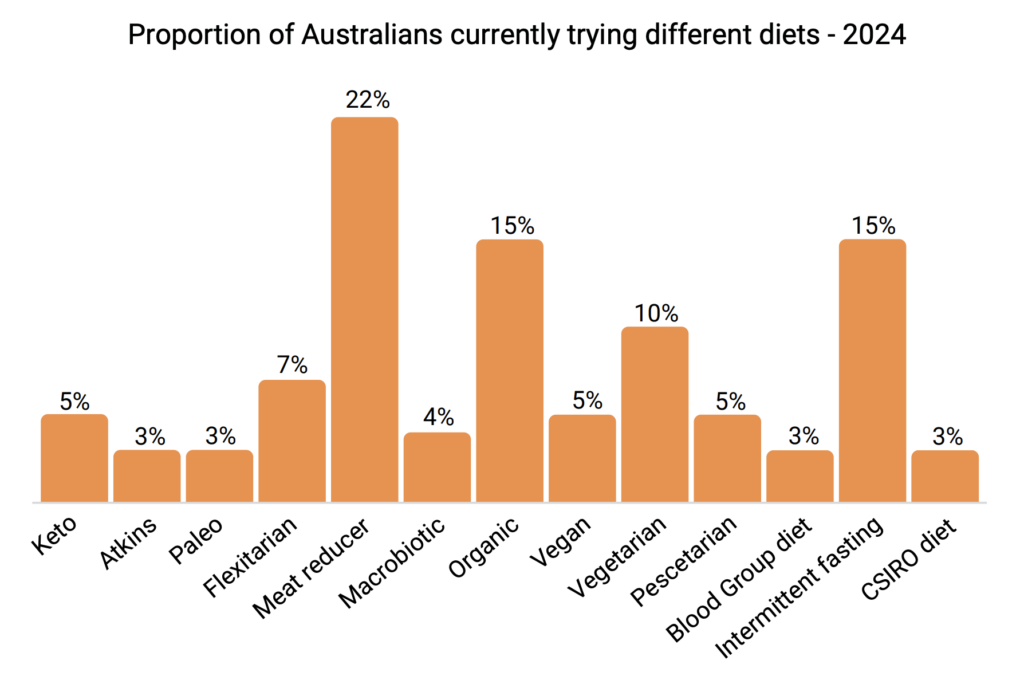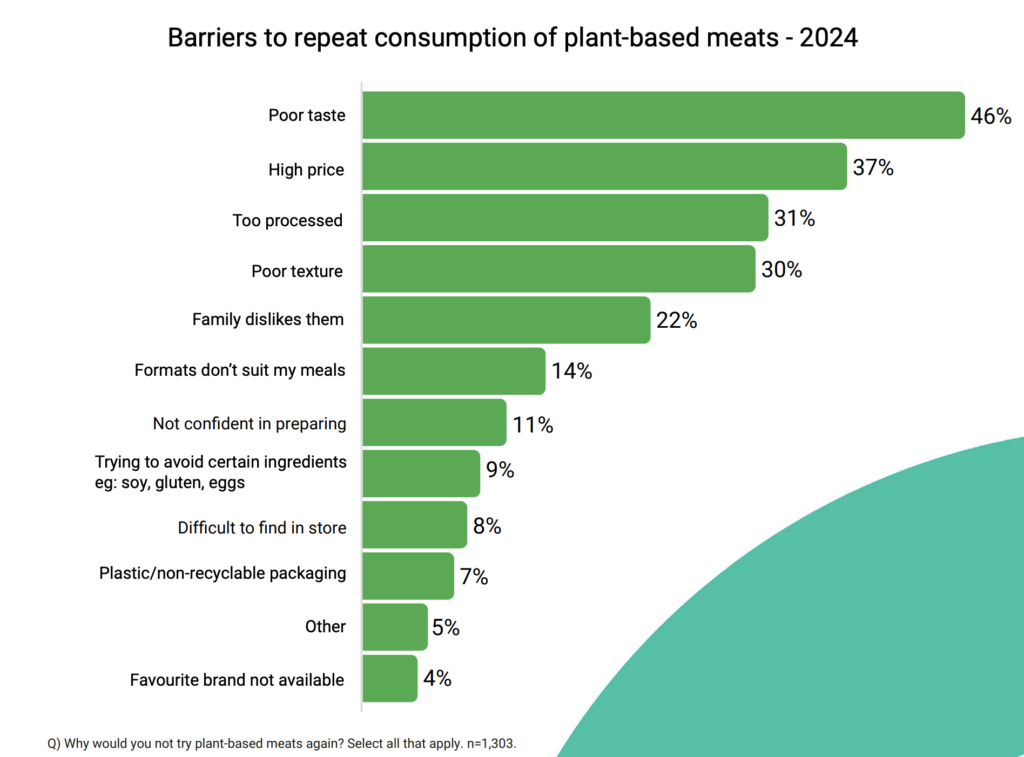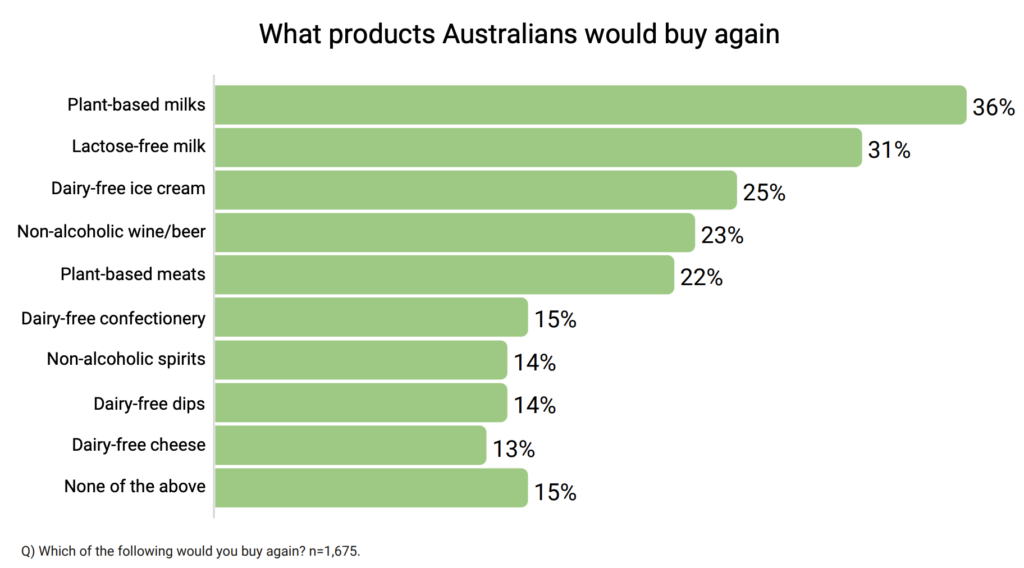One in Five Australians are ‘Meat Reducers’, With Interest in Plant-Based Analogues Driven by Health
5 Mins Read
More than two in five Australians are reducing meat or don’t eat it at all, with health a major consumption driver. But taste and price remain key challenges for plant-based meats.
Australians are cutting back on meat due to health and price concerns, but adoption of plant-based meats remains low, and their taste is a big reason why.
One in five (21%) of citizens are ‘meat reducers’ – people who are eating less meat but don’t identify as flexitarians – making it the most popular diet in the country, according to a 2,000-person survey conducted by Toluna for think tank Food Frontier.
Respondents were asked to choose from 13 different dietary patterns – 10% said they were vegetarian, 7% flexitarian, and another 5% vegan, meaning that 42% of Australians are either reducing meat or not consuming it at all.

This year, a quarter of respondents have reduced their meat consumption, while 12% are planning to do so, and 2% have eliminated it altogether. The top three reasons for this were health concerns (61%), budgetary constraints (54%), and climate change (37%) – the latter is a welcome surprise, given the country has one of the largest climate denial rates in the world.
“The cost-of-living crisis may be affecting meat consumption,” suggests Food Frontier CEO Simon Eassom. “Over the past four years, the importance of budget as a motivator for reduced meat consumption has increased significantly, rising from 40% in 2021 to 54% in 2024.”
Plant-based meat needs a taste kick

The dietary drivers in Australia remain similar across the spectrum. For example, 54% of meat reducers said they were doing so for health, 28% also picked medical reasons, and a third (34%) pointed to climate concerns. In the same vein, flexitarian diets are driven by health considerations (58%), medical reasons (34%) and environmental worries (24%).
Similar to the results in 2021, 79% of Australians go meat-free at least one day a week, with a quarter (24%) doing so for three to four days.
But while meat reduction is popular, plant-based analogues to meat still have some way to go – only 35% of Australians have tried these products (up from 25% three years ago), and just 16% eat them regularly.
Australians are most attracted by plant-based meats’ health benefits (53%). Nearly half (45%) enjoy their taste, 38% recognise their environmental advantages, and 36% do so for ethical reasons. However, this is in contrast with the 70% and 54% of Australians who chose health and environment, respectively, as reasons for liking meat analogues.

But these products have low repeat purchase rates, with only 22% of Aussies saying they’d buy them again. Poor taste was cited as a barrier by 46% (down from 52% in 2021), followed by their high price (37%, versus 39% three years ago) – this is despite the price premium of plant-based meats narrowing from 49% in 2020 to 33% last year, according to Food Frontier’s 2023 State of the Industry report.
That study also revealed that plant-based meat sales in Australia increased by 47% between 2020 and 2023, with per capita consumption up by 28%.
Meanwhile, 28% of Australians buy both plant-based meats and traditional plant proteins like tofu and lentils, and one in five prefer the former because they don’t know how to cook the latter.
Milk analogues popular in Australia, but climate connection remains low

Mirroring global trends, plant-based milk seems to be the leader in Australia’s alternative protein space, with two in five respondents (41%) having tried these analogues, and a third (34%) drinking them on the regular.
A similar number of consumers (36%) are likely to repurchase plant-based milk after trying it, the higher among the rest of the foods in the survey. Meanwhile, more consumers have tried vegan ice cream (37%) and would buy them again (25%) compared to meat analogues. But vegan cheese leaves a lot to be desired – only 13% who’ve bought it would do so again.
“The study also aimed to understand Australians’ perceptions of climate change contributors and how these considerations are influencing their dietary choices,” said Eassom. Agriculture makes up 13% of Australia’s emissions, and at least 66% of this comes from livestock farming.
But while 66% of Australians realise that fossil fuels contribute to climate change, less than half said so for food waste (45%) and animal agriculture (44%). And when asked what actions they take to reduce their impact on the planet, 76% noted that they recycle – by far the most popular act. Only 22% and 16% have been cutting out meat and dairy, respectively, to fight the climate crisis.

“It appears that some Australians are making a connection between animal agriculture and climate change; however, from a list of perceived key contributors to climate change, animal agriculture was selected by the least number of study participants,” said Eassom.
“This would indicate that, despite growing awareness amongst some consumers, more than half of Australians are either unaware or not concerned about the relationship between food production and climate change.”
The survey also looked at Aussie attitudes towards pet food, finding that consumers are split on their willingness to change their furry friends’ diets. More pet owners would buy wet pet food with ethically raised meat (49%) or minimal animal ingredients (44%) than products with no animal inputs (38%).
“That pet owners are interested in switching to other foods as long as they are nutritionally sufficient demonstrates a market for sustainable and innovative pet food options, mirroring the growing interest in diverse protein sources in human diets,” Eassom said. “In response to this, we are seeing a number of companies exploring alternative proteins, including cultivated meat, in pet food production.



